I don’t think there can be any doubts, the River Trent is by far and away the UK’s finest barbel river. There, I’ve said it. Number One. Top Dog. The best. Indisputable.
Trouble is, everyone’s saying it. Everyone and his dog knows and wants to jump on the band wagon. Those of us who’ve had it so good for so long are getting a bit squeezed, feeling the pressure. Yes, we’re Little Trentlanders at heart, the vast majority of us. Bugger off you Johnny Foreigner glory hunters. Get orf my land!
Almost every decent UK barbel river of the recent past is in decline. Take the Great Ouse, Wensum, Kennet, Bristol Avon, Teme, Severn, Hampshire Avon, Stour and Dove; the Swale, Nidd and Wharfe in Yorkshire as examples. And was the Thames ever really an attraction? One or two very big fish, yes, but barbel fishing as opposed to hunting down an endangered species? I don’t know, you tell me.
The situation was brought into sharp focus recently when Steve Pope, Chairman of the Barbel Society called upon angling’s governing body The Angling Trust to help save barbel stocks across the whole of this fair isle.
In an open letter to the Press, he said the Trust must use their close contacts and influence with the Environment Agency to improve stocks.
The letter states: “It is with great concern that I put pen to paper with regard to what we see as the significant, in some cases irreversible, decline of the barbel populations on many rivers in the UK.
Irreversible. Past the point of no return then, for some. But what can the man on the Clapham Omnibus do about it? Not a lot to be honest. Were it not for two major rivers the situation would be catastrophic and even their futures cannot be taken for granted.
I keep hearing claims about the Wye being wonderful. It is. Please go there and fill your boots. Pay the Wye and Usk £20 a day, ask them to put a couple of crosses on the map they give you, those are the two barbel swims on your beat, sir, just cast a feeder into the gulley opposite, just above the overhanging tree, or sit on the groyne, an underarm swing will put you on fish. Yes, a pellet feeder is all you need. Enjoy. Meat’s allowed, but no maggots, don’t want you catching any of our salmons…
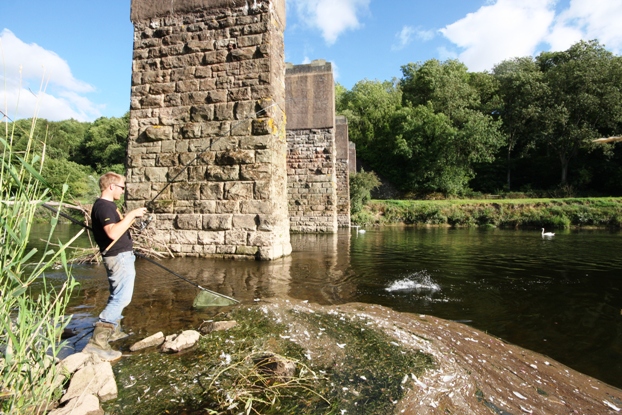
The Wye Valley is as picturesque and idyllic as a Crabtree cartoon. It’s a wonderful place to roam and to explore. It’s up there with my favourite places in the whole world. And despite its popularity it doesn’t get anywhere near the pressure that the Trent is getting. Nor does it receive attention round the clock. Or indeed much pressure at all after October.
No, the Trent is numero uno for length, for width, flow, for numbers of fish, size of fish and if you listen to what some folk would have you believe, its barbel are dead easy to catch. And they are. To a point. Like all barbel, if we’re being perfectly honest. They’re even easier to catch if you’ve never been there and only read about it on t’interweb or in the press. Funny isn’t it though how so many turn up with high expectations only to return home with their tails between their legs…
‘I normally carp fish but fancy catching some barbel. Have heard Collingham is good. What peg numbers do I need to fish, can I park behind my peg, how far should I cast,will 5 ounces hold, are my carp rods strong enough, what’s the best boilies, is it worth back leading, thinking of putting 3 kilos in and sitting on it, is this enough…?’
How many times have we read this?
And no-one brags about the blanks which are more common than you think.
Allow me to let you into a little secret about the barbel Klondyke. It won’t last. This is its heyday. This is the peak. Some are suggesting we have already passed the peak. Slowly but surely, inevitably the river will change. The Trent is, has been and always will be a work in progress. It is not a barbel river. It just happens to qualify as one right now. A bit like certain International sportsmen turning out to play for England, or Wales. Fifty years from now there will be kids born in Europe who’s lineage will qualify them to play for half the nations between North Africa and the Arctic Circle. Meanwhile the Trent’s current ‘enrichers’ are barbel.
Chances are there will always be barbel in the Trent. There always have been, going back hundreds of years, but the river is prone to population cycles. The biomass of individual species rises and falls like the tide ebbs and flows.

Colin Dyson writing about Tom Pickering
Tommy Pickering’s reputation was sealed as ‘the bionic bleaker’ back in the days when he could catch 20lbs of bleak from any swim. Where are they now? The Lancastrians came marauding over the Pennines to take phenomenal catches of roach on casters, with names like Ashurst and Heaps at the fore. There were millions of gudgeon for a while. Then there were the chub years, Dorman’s Donkeys and ‘give ’em a gallon’. Who remembers Pomeranians and bottle tops? Big catches of bream? The explosion of carp in the 1980’s. Right now there are stretches I could take you to and you can’t get a maggot to sink more than a foot before a dace has it. The perch are massive in some areas. And all this was before the alien invasion. What impact will zander, catfish and sturgeon have in the long term? Two-pound roach are falling to stupid baits like boilies and big pellets. Chub are becoming rare, yet fish to 8lbs keep cropping up.

The Trent is much more than a barbel river.
And let’s not forget the Angling Times headline that announced the Trent was completely dead not so very long ago.
Dear me, that was probably the most embarrassing and ill-informed cock and bull story in angling history. Except perhaps the one where scientists informed us that after studying cormorants for two years they had reached a conclusion that the birds didn’t eat fish! Okay, and there is the one about otters not damaging fish populations, too, so maybe shouting from the rooftops that the Trent was dead isn’t the worst ever error of judgement, but it’s probably up there with predicting Manchester United will be in League two in 3 years time.
Possible? In theory. But highly unlikely.
Immediately following those shock-horror headlines I challenged Times editor Richard Lee to join me on the Trent at Smeatons to prove to him that the Trent was anything but dead, It’s a short day ticket stretch near Newark that Martin Bowler has featured several times in his weekly column in recent years. Well, to cut a long story short I caught about 80lbs of chub, bream and barbel. Poor bloke couldn’t believe it. But fair do’s, he invited me to shoot a feature there, which I did, on a different peg, as a kind of redress.
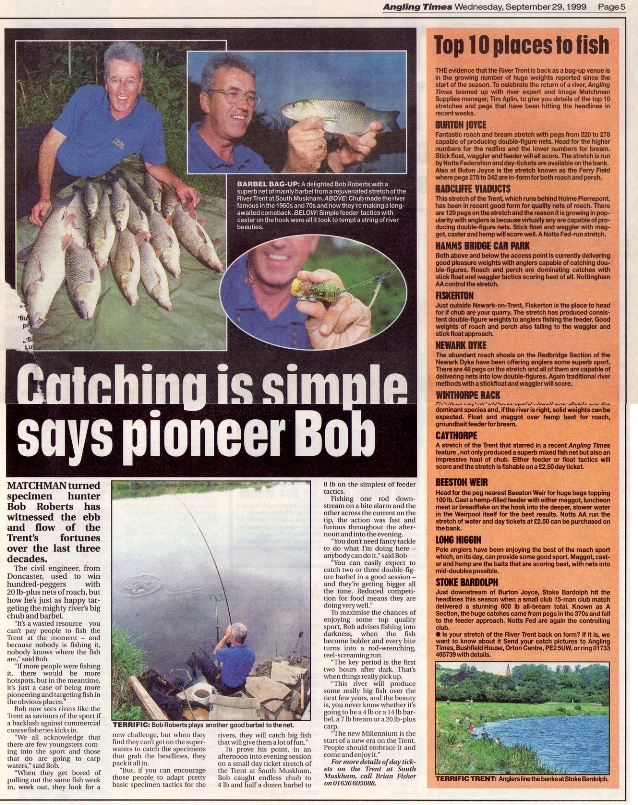
Back to the future – late-1990’s. We were catching barbel in the 80’s, too.
The moral of the story is, don’t get carried away and make claims on flimsy evidence. And to those who think the Trent is dead easy, perhaps you should come and fish it away from the headline grabbing hot spot before pontificating so loudly. I will be the first to admit that certain swims are like hook-a-duck fishing but headlines lauding the capture of 40, 50 or even 60 fish with umpteen doubles in a weekend don’t impress me.
That’s not skill. It’s slaughter. Carnage on an industrial scale.
Let’s take the situation at Cromwell Weir as a prime example, and let me clearly emphasise this is nothing personal towards any individual or individuals. As things stand, if an angler booked and then decided not to fish the hot peg there would be a mass brawl among others fighting to jump in his place. Indeed there has been. Peg 1A will not get a rest for the foreseeable future.
The current rule, as I understand it, is you have to book all of the first 10 pegs in order to fish there as if you are pegging a match. Doesn’t matter if it’s an individual angler booking all ten or a group. You stump up your £100 or whatever and it’s yours till the clock runs down, and it’s booked out months in advance. Anglers are teaming up to fish it round the clock, bivvies pitched behind bivvies, seven days a week, month in, month out.
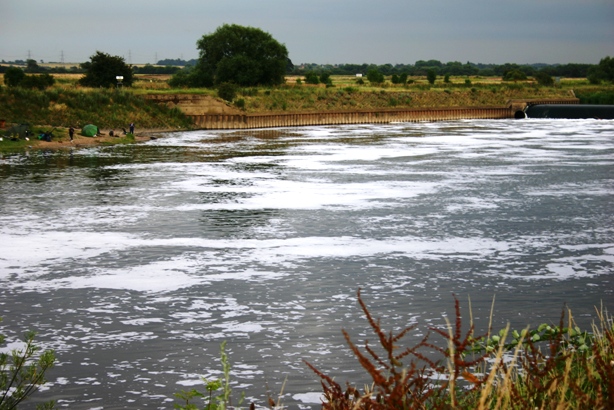
Stop and think about that. We purport to care for the fish we catch. Why else a handling code? Why knotless keepnets, barbless hooks, braid bans, unhooking mats, carp cradles, Klinik (other brands are available) wound care, closed seasons, etc. So tell me, how much angling pressure on a shoal of fish is acceptable, no matter how big that shoal?
Then maybe ask the same anglers how they’d feel about stuffing a load of barbel into a commercial pool instead and fishing for them round the clock…
And believe me, it’s not just Cromwell. Every single weir is an angler / barbel magnet. It’s biological, in their DNA. Barbel migrate upstream each springtime in numbers. It’s what they are conditioned to do. Fish journey upstream to spawn so their offspring will be spread downstream on the current. Species survival instinct kicks in. Unfortunately they can go no further than the man-made obstacles called weirs. It the traffic jam effect.
Most of us have fished lakes where out-of-bounds areas exist, a sanctuary where the fish can get away from the pressure. They don’t stay there forever and when they venture out they may get caught. If anglers were allowed to plunder the sanctuary it might boost a few egos in the short term but it won’t do much for the overall fish stocks and fishing in the long run.
Does anyone honestly think that plundering barbel in Trent weirpools, round the clock, day-in and day-out is doing the fish any good? Are some of these fish dying? Because I’ve watched from the far bank on occasion and timed how long barbel are out of the water for and it’s ridiculous sometimes. There’s no proficiency requirement for booking the hot peg. Do you treat the 30th barbel of a trip with the same admiration as the first?
How often do you read on social media about barbel floating down river, belly up in early summer? The fingers are soon pointing, daggers are drawn and the blame game begins, but whatever the cause, let us not forget there is not an infinite supply of mature barbel, even in the Trent. Each dead fish is a small nail in the rivers’ coffin.
Should you doubt this is possible then just think on, man practically wiped out the bison and the passenger pidgeon in the matter of a few short years yet the populations were thought to be endless. The fate of the Passenger Pidgeon is probably the most terrible example of mass slaughter in the history of wildlife – a story that almost defies belief. There were 5 BILLION of them when the settlers crossed the Atlantic. Very soon the species was extinct.
What about those huge roach catches that used to be taken in Irish closed season matches. 400lb nets of migrating roach, gathering to spawn, crammed into keepnets. Where are they now? Where are the anglers that trod the banks, filled the guest houses and drank in the pubs…
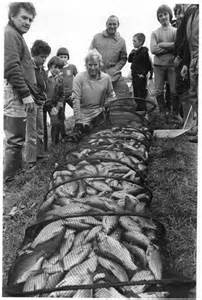
Ah, but you interject, if they keep catching loads of barbel from the weirs then obviously no harm is being done. I see your point…, BUT…, barbel are a nomadic species. Scientists have recorded them covering vast distances, several miles in 24 hours is nothing, yet the distance between weirs on the Trent, on average, is about 4 miles. Could it be the ones that mooch upstream reach a point where they can swim no further, decide to have a few days in the spa and, hang on, what’s all this food? Dig in lads!
And new fish arrive the next day, or next week like a conveyor belt.
If you doubt this isn’t happening then why do the fish that get caught every day not have mouths like commercial fishery carp?
Truth is, what happens in a weirpool has an impact on the whole river below it. The reason Cromwell weir produces bigger catches than the other weirs is that there are no more weirs downstream and the fish can swim 20 miles or more unhindered. That and the fact that the pool is physically far larger than any of the other weirpools although only effectively bank fishable from one location, Peg 1A. Possibly throw in Peg 1 at a push. Therefore, whatever happens in the weirpool, over time, will be to the detriment of the river downstream and on those grounds, if anglers really cared about the future of the river as a whole and for barbel fishing per se they would stop treating weirpool fish as a commodity and be seriously looking to reduce if not curtail the pressure being put on them.
If the pool is so prolific why are anglers using multiple rods? Why not just use one rod? Because it’s a cock measuring exercise. You have to catch loads or risk being deemed a failure.
Indeed the newspapers would do everyone a favour if they stopped hyping up the mega catches and maybe the social media crowd should be offering thumbs down instead of likes.
We have to start somewhere.
Perhaps those who control the fisheries need to look at this. Surely they have a duty of responsibility to the species and the river as a whole. Here’s a controversial theory. Close the weir pegs from June to the end of October and it will have a positive effect on the long term sustainability of the Trent’s barbel population. Think about that.
Do feel free to disagree with me by all means and perhaps put forward your own views. Justify them all you like. Tell me I’m wrong. But please do it reasonably and intelligently through measured debate. Any comments from knuckle draggers will go straight into the trash can, but you know that already.
Which brings me round to the numbers game.
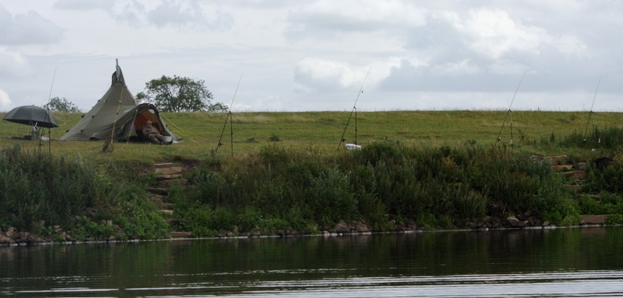
Come on, let’s all be honest, the basic techniques used to catch barbel from the river Trent could be learned by a primate. If your thing is camping by a river, hurling 6 ounce feeders to the horizon, pointing carp rods skywards secured to lightweight scaffolding kitted up with bite alarms then you have my total blessing to do it.
By all means, sleep by your rods for all I care. I know that’s frowned upon by the Barbel Society but I’m not going to object. I might take issue if I want to fish the water I pay handsomely to fish on the opposite bank but you insist on casting into, but you know deep down inside that when you do that on the Trent you’re not just taking a liberty, you’re absolutely taking the p*$$…
‘Oi! I’m fishing in your water. Go somewhere else!’
Can you imagine sitting down in a pub, placing a fresh pint down in front of you and the stranger opposite reaches over and takes a swig? Bet you’d think that was out of order.
But I digress. You can catch barbel in your sleep on a bolt rig. So what’s so clever about setting targets concerning numbers. ‘This year I am aiming to catch 300 barbel.’ Says the budding legend in the making.
Wow. Big Deal. So that’s 6 sessions on Cromwell then? Or if you fish a less prolific stretch, a weekly session. Or maybe less if you know a few hotspots. Numbers mean nothing. Certainly they’re not a yardstick by which you measure your skills and ability.
You might as well be on a factory production line. It’s borderline monotony. If you can catch ten then surely we know and you know you can catch a hundred, or 500. It is a repetitive process governed by location and time available, that’s all. It’s not down to skill. It’s a process. Effectively you’re treating wild barbel like puddle pigs. Why not just head for the nearest commercial and save yourself a bit of time and fuel. Go ahead, sack up, bag up, slaughter them, create carnage.
And what about the ‘how many you caught in your last session’ conundrum. The match angler says, ‘Ten! Whilst the bivvy tramp says, ‘Pffft, that’s rubbish, I had 24.’ But one did it in 5 hours whilst the other took 3 days and nights….
Seriously, stop for a minute and think. Ask yourself, what am I getting out of this? What is the point? Who am I impressing with these statistics? How long can I keep on playing the numbers game before the penny drops. Change your mind set. Change your goals before the rot sets in and you become disillusioned. Give some thought to how best you can enjoy your fishing to the maximum – the fishing, that is, not the bragging about it.

The question that should be on every barbel angler’s conscience should go: Is what we do fair on the fish? Should Collingham (and other weirs) impose restrictions on rod numbers, night fishing, rest periods, members only, a publicity ban, or any other suggestions you care to make, for the sake of the fish and the river as a whole? Or should they simply cash in while it lasts?
Let me share a little story. Brian Skoyles and I went fishing recently with an up-and-coming youngster called Alfie Naylor. He couldn’t believe how enthusiastic and excitable a couple of battle-hardened old fogeys like us could be about our fishing. And then the penny dropped. It’s not about what we catch, it’s about how we catch. In a nutshell that’s the secret to a long and enjoyable career in angling.
And to learn more about that I guess you are going to have to read the next article, Five Easy Pieces.
